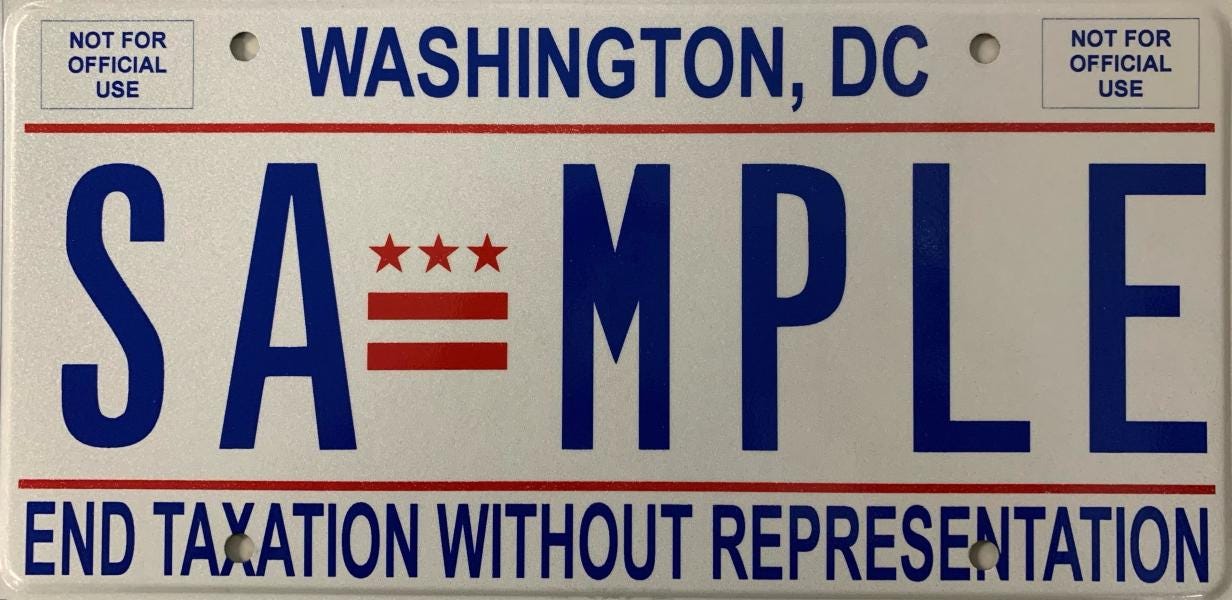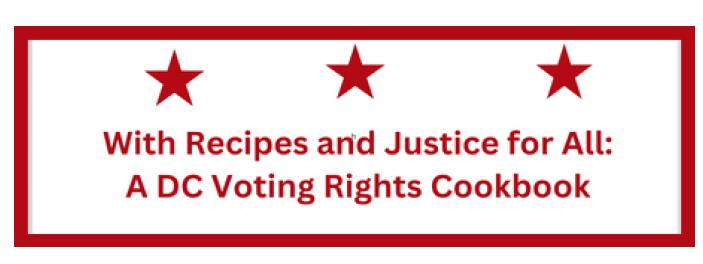Worried about democracy? Check out the 'pretend power' of DC
Residents of the nation's capital are unique across the world in their lack of voting rights.
I moved to Washington, D.C., over 40 years ago to report on national politics. On that day I lost rights that are automatic in the 50 states—rights I took for granted while living in Michigan, New York, West Virginia, and Pennsylvania, and rights that people exercise regularly in Maryland, a mile north of my house.
My ballot this month in the District of Columbia had six races on it, but only the presidential primary and two city council contests would be familiar to most Americans. Beyond that, we could vote for a pair of purely symbolic federal offices—a “shadow” senator and House member—and for a House delegate.
As the D.C. Code says, “The Delegate shall have a seat in the House of Representatives, with the right of debate, but not of voting.” Or, as John Oliver put it in a classic 2015 segment, the D.C. delegate has “pretend power.” This seat has been held since 1991 by Eleanor Holmes Norton, 86, who was a national civil rights leader and the first woman to head the U.S. Equal Employment Opportunity Commission.
The contrast between my career (covering campaigns for president, Congress, and governor) and my personal political life is only slightly less ironic than Norton’s non-voting delegate position after decades of trying to expand rights for women and people of color. In my case, four decades of paying federal and D.C. taxes and four decades of being unable to elect a U.S. senator or representative. That’s four decades of taxation without representation. That might ring a bell; it’s what sparked the Boston Tea Party and the American Revolution.
I’ve made no secret in recent years about my dream of statehood for D.C., which has more people than Vermont or Wyoming. But I’m now reconsidering retrocession—the idea of returning D.C. from whence it came, to become a county in Maryland.
It wouldn’t be unprecedented. Congress returned Alexandria to Virginia back in 1846. At the same time, there’s no question that Washingtonians overwhelmingly want statehood, and most Marylanders (57% as of 2019 ) don’t want us.
There are all kinds of reasons to prefer statehood. Two senators from an urban center, blue for now, would help correct what’s become massive over-representation of conservative, sparsely populated America. How could it be fair for California, the fifth largest economy in the world, the largest U.S. state, with over 39 million people, to have the same two senators as Wyoming, with less than 590,000?
That’s the way the Founders set it up, 60 years before Congress added California as a new state and a century before adding Wyoming. But partisans made it far worse, as historian Heather Cox Richardson wrote in a 2019 Atlantic article about “the mass admission of underpopulated Western territories” that “still warps American politics” 130 years later. The influence of red-state conservatives today—particularly on the judiciary—has grown so distorted that a rebalancing is overdue.
Scholars and statehood advocates contend Congress could vote any time to shrink the federal enclave and make the great bulk of D.C.—all but a two-mile section of federal buildings—the 51st state. Politicians have always argued against admitting states. Rep. Jamie Raskin of Maryland, a constitutional scholar, gave a wry rundown at an often amusing 2019 House hearing: Too Mormon and polygamous (Idaho and Utah), not contiguous (Alaska and Hawaii), already another country (the Republic of Texas), already part of another state (“Maine because it used to be part of Massachusetts; Vermont because it used to be part of New York. West Virginia and Virginia. Kentucky and Virginia. Tennessee and Virginia.”).
Needless to say, none of those past arguments worked. Nor has any other democracy followed our example. Raskin again: “The United States is the only democratic nation on Earth which disenfranchises the residents of the capital city in its national legislature. We spend hundreds of millions of dollars promoting democracy around the world. We have never been able to sell to any other country, and I don’t even know if we tried, the idea of disenfranchising hundreds of thousands of people who happen to live near the national parliament.”
To make enfranchisement happen, Democrats would have to run the table in Washington, make D.C. statehood a priority, and suddenly develop the audacity to actually do it—even if it took killing off the Senate filibuster, a tradition that requires a supermajority of 60 senators to advance bills. Republicans will do what they must to head off two new senators from D.C. who would further the Democrats’ supposed “socialist agenda.” GOP House members, meanwhile, are trying to run the district themselves.
Conservatives clearly have struck gold with alarmist fundraising pitches centered on blocking and banning D.C. statehood. My inbox is filled with warnings about “playing with borrowed time” and politicians “dreading” to have to tell me (and you) that “our efforts to block D.C. statehood have hit a DEAD END. And now, Republicans may never win another election unless you take every last word of this email to heart.” And we’ve got to give right now. “Democrats are DAYS away from making D.C. the 51st state,” one version goes. Another template describes statehood as “imminent.”
That one was tough for me. I used to get a fleeting sense of hope seeing that word, and subject lines like “102 senators,” until it finally sank in that conservatives were simply trying to squeeze money out of people too naïve or busy to realize that D.C. statehood was the absolutely, positively, furthest thing from imminent. They will not be giving up this cash cow any time soon.
Thus, the retrocession backstop. If D.C. rejoined Maryland, we’d still be voting in local races, from mayor on down. But we’d also be picking governors, state legislators, House members and senators—this year a Senate choice between Angela Alsobrooks, a Black Democrat who won a primary endorsement from the Washington Post, which called her compelling, and Larry Hogan, a popular two-term governor who is, as I wrote last week for The Bulwark, among the vanishingly few Republicans trying to resist the Trump/MAGA tides.
It would, in truth, be bracing and wonderful to participate in Maryland elections. But being our own state would be better.
After so many years of observing instead of partaking in the national ritual of voting in congressional races, it seemed like time for action of some sort. My longtime friend, Laura Kumin, wrote a 2020 book called All Stirred Up, about how suffragists used cookbooks to spread the word on votes for women to households across America. She dreamed up a new project based on that model, and we’re now working on it together: With Recipes and Justice For All: A DC Voting Rights Cookbook.
Our book will look at how we got to this point and how we might change things, whether through statehood, retrocession, or some other type of political deal that’s fair and achievable. We’ll also help out-of-towners get to know D.C. and all its neighborhoods and charms (yes, it has many of both). And of course, we’ll have dozens of recipes and short commentaries from people whose names you probably know and other people you’ve never heard of. If you have a recipe (your own or a family recipe) you’d like to submit for consideration, email us at cookbook4dc@gmail.com.
If you’d like to learn more about this issue, you could read that House hearing transcript. Or you could watch John Oliver explain it all in his hilarious 17-minute video, in which he joked toward the end that he’d been using a 51-star flag all through it and no one had noticed. So no biggie on the flag!
The video concludes with innocent children singing a song of freedom—specifically, children egged on by Oliver, singing about the shafting of Washington, D.C. “If you’re totally convinced that there should be just 50 states,” he prompted the kids in their musical finale. Their response (which has become increasingly appropriate over time):
“Well then let’s all kick out Florida ‘cause no one thinks they’re great.”
Amen.






I was born in D.C. in 1940. My family lived all over the country when I was growing up, then we came back and lived in Arlington. I graduated from American University in 1962, and lived in the District until 1969. I voted for the first time in my life in 1968, because we finally got the right to vote, even though it was limited. We couldn’t elect our own mayor even at the time I moved away. I have hoped that before I die the District might gain statehood. I wouldn’t want to be part of Maryland. We are a separate entity. Because the district has a plurality of Black citizens, Republicans have continuously blocked statehood for us. What the rest of the country needs to do is elect Democrats who would back the proposal to make D.C. a state.
Disenfranchised at birth cuz I’m native Washingtonian. …
It ain’t right and they know it.